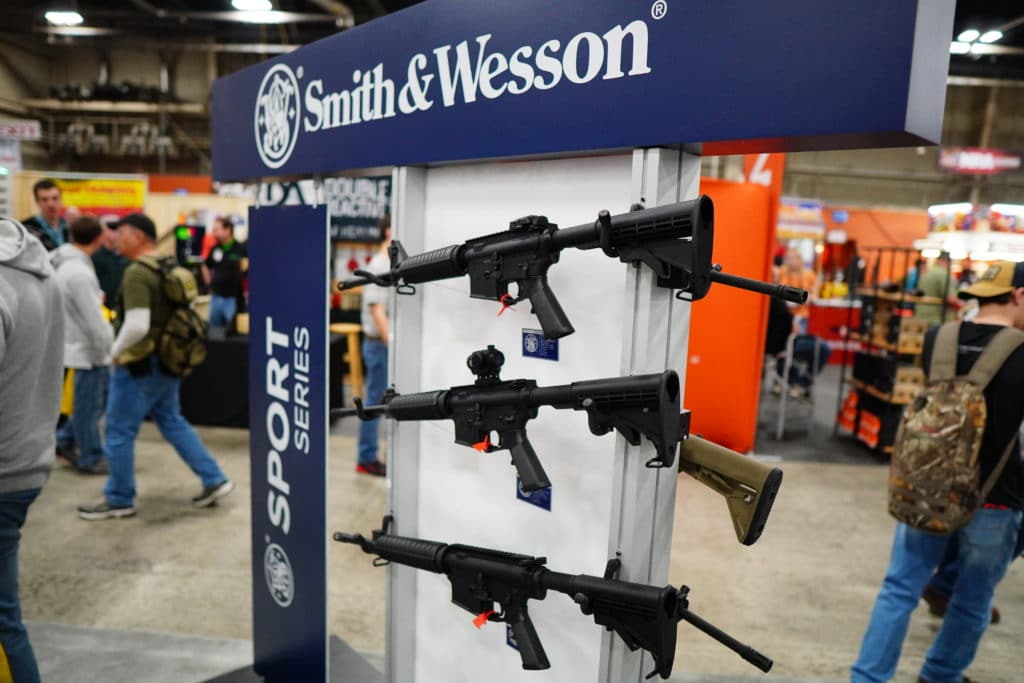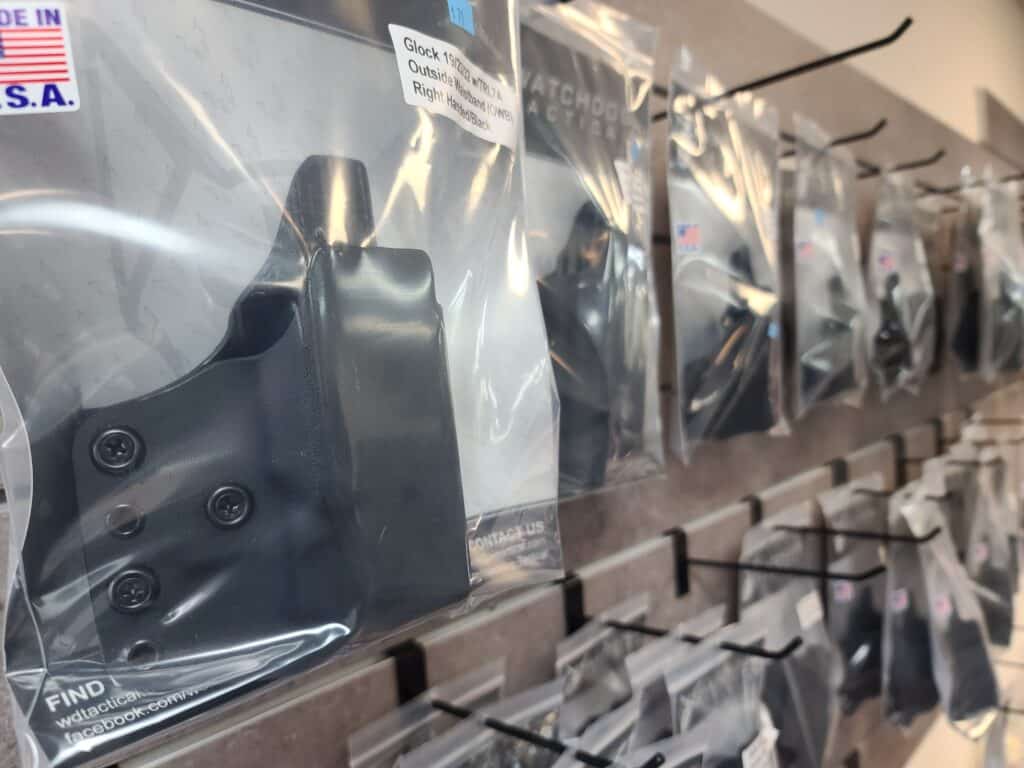Last week, we wrote about some bad signs in polling for the gun-rights movement. This week, we’re doing the same for the gun-control movement’s legal prospects.
The early impact of the Supreme Court’s Bruen decision ought to be concerning for gun-control advocates the same way rising support for stricter gun laws should concern gun-rights advocates. On Tuesday, we saw a second federal judge block enforcement of another “assault weapons” ban in Colorado. Now, all the prohibitions in the state are on hold.
What’s worse, governments defending the bans have yet to even attempt to defend their laws under the Bruen standard. California has instead asked for more time to figure one out. They’re unlikely to get that extension, and it’s unlikely to turn the required historical analogue necessary to uphold the restriction.
At the same time, the trend of federal judges protecting the gun rights of 18-20-year-olds has continued post-Bruen too. Contributing Writer Jake Fogleman explains why that trend is likely to accelerate even as public opinion moves against the gun rights of adults under 21.
Plus, Rob Pincus from the Gun Makers Match joins the podcast to update us on how the “ghost gun” kit ban is being implemented.

Analysis: AR-15 Bans Are Floundering in Court [Member Exclusive]
By Stephen Gutowski
This week, the courts cast more doubt on the constitutionality of “assault weapons” bans.
Hot on the heels of a bit of a resurgence in the political prospects of the bans, culminating in the House of Representatives passing the first one in decades, their legal prospects took a nosedive. On Tuesday, a Biden appointee blocked Boulder County, Colorado’s ban on AR-15s and similar rifles. That came shortly after an Obama appointee did the same to Superior, Colorado’s ban.
Both federal judges cited the Supreme Court’s new Bruen standard, which requires gun laws to be rooted in early American tradition to survive scrutiny, as the basis for their rulings.
“The conduct regulated by this provision of the Amended Code, the right to possess, sell, or transfer illegal weapons, (which, as defined, include weapons commonly used by law-abiding citizens for lawful purposes), is covered, at least in part, by the Second Amendment, and therefore that conduct is presumptively protected,” Judge Raymond Moore wrote of Superior’s ban.
Even lower court judges who seem inclined to sympathize with the goals of AR bans may now feel obligated to strike them down.
“The Court is sympathetic to the Town’s stated reasoning,” Moore wrote. “However, the Court is unaware of historical precedent that would permit a governmental entity to entirely ban a type of weapon that is commonly used by law-abiding citizens for lawful purposes, whether in an individual’s home or in public.”
Now all of the local AR bans in Colorado are on hold with an agreement to consolidate the cases against them. The bans in California and Maryland may well be next.
Moreover, nobody seems to have formulated a coherent defense of AR bans under the Bruen standard. Neither of the Colorado jurisdictions filed an opposition brief to the requests for a temporary restraining order. Maryland hasn’t submitted its defense yet.
California has filed a response in Miller v. Bonta, the suit against its ban. However, it doesn’t actually attempt to defend the law. Instead, it asks for more time to develop a defense.
“This analysis should not be rushed,” California wrote in its brief. “Although Defendants cannot provide a precise estimate of how much time would be needed to conduct a thorough identification and review of source materials, at a general level, a historian conducting original research on primary-source materials would fairly expect to conduct many hours of work to yield several sentences of written historical analysis.”
California asserts an argument. It’s the one you’d expect if you’ve read the Heller and Bruen cases: the “dangerous and unusual weapons” exception the Court has identified. California argues AR-15s and the other guns it bans fit in that exception. However, they don’t identify any actual laws that could be considered historical analogues to their ban. Instead, it asks for more time to find some.
“Here, California has strong arguments as to why its restrictions on assault rifles are constitutional under that test: Bruen repeats Heller’s assurance that States may regulate access to ‘dangerous and unusual weapons’ consistent with the Second Amendment,” the state said. “And further discovery will allow Defendants to develop a record on how the AWCA imposes a ‘comparable burden on the right of armed self-defense’ as historical restrictions and that the modern and historical regulations are ‘comparably justified.'”
That’s a bit odd. It feels a lot like a stalling tactic. A doomed one at that since the case is back in front of Judge Roger Benitez, who previously struck it down along lines similar to the analysis Bruen now requires.
After all, it’s not that hard to find some historical bans on “dangerous and unusual weapons.” If you’re going to argue AR-15 bans fit into historical bans on some kinds of weapons, you could at least start with the archive Duke University has put together. That’s the point of the database, and there are some examples in there.
Of course, those examples don’t look very much like a ban on the most popular rifle in the country. Mostly, the ones from the relevant period before the adoption of the 14th Amendment involved bowie knives or bans on carrying weapons in a way meant to cause terror. Nothing in that database is nearly as expansive as these “assault weapons” bans.
But that’s why California wants to keep looking. Or, perhaps, they’re merely waiting for a more favorable court to present the weaker analogues and hope they’ll be enough. They’re unlikely to back down.
The same goes for Boulder, Colorado. They said they don’t plan to give up on defending the law.
“At the hearing, the county will demonstrate that its assault weapons ordinance is constitutionally sound,” Gloria Handyside, a spokesperson for the county, told The Reload on Tuesday.
“Assault weapons” bans aren’t anything new, though. So, it seems unlikely a new example of a historical analogue will materialize in the nick of time to save these laws from being struck down.
It’s much more likely the era of the “assault weapon” ban is over.
Podcast: Gun Makers Match Organizer Rob Pincus Updates Us on the ‘Ghost Gun’ Kit Ban [Member Early Access]
By Stephen Gutowski
This week we’re looking at the practical impact of President Joe Biden’s “ghost gun” kit ban. The ban went into effect just a few days ago. So, it’s a good time to check in and assess the fallout.
That’s why we’ve brought Rob Picus on the show. Rob is one of the key organizers behind the gunmakers match, a shooting competition for people who build their own firearms. He has become engrained in the homebuilding community.
He said companies that make 80 percent frames or receivers have begun to test the new legal landscape. At least one company has made the unserialized and unfinished parts available for sale apart from the jigs and drill bits needed to finish them. Since the ATF rule considers the parts being sold alongside what’s required to build them into a working gun the same as selling a working gun, the strategy to remain compliant appears to just be selling everything separately.
Rob said Polymer80, one of the market’s biggest companies, is also moving towards selling unfinished receivers on their own. Still, there are a lot of unanswered questions with potentially disastrous consequences for anyone who answers wrong. Rob explains the potential pitfalls.
He also gives his view of the state of the effort to reform the NRA from the inside. Rob is a board member of Save the Second, which was formed to try and oust current NRA leadership and impose new internal controls after accusations of financial impropriety began hounding the gun-rights group. However, he admitted the reform movement has been much less successful than he’d initially hoped as this week’s news that dissident board member Philip Journey is not being renominated for this year’s ballot by his fellow board members.
Plus, Contributing Writer Jake Fogleman and I discuss how California and New York are pushing back against the Supreme Court’s gun-carry ruling.
You can listen to the show on your favorite podcasting app or by clicking here. You can also watch the entire episode on our YouTube channel. As always, the show goes public on Monday. Members get access on Sunday AND the opportunity to appear on the show for a member segment!
Make an Appearance on the Podcast
One of the many perks of a Reload membership is the opportunity to appear on the podcast for a special segment. If you’re interested in joining me, simply reply to this email. We’d love to have you on!

Analysis: Dismissed Lawsuit Could Still Spell Doom for New York Gun-Carry Law, Copycat Bills [Member Exclusive]
By Jake Fogleman
A federal judge may have allowed New York’s Concealed Carry Improvement Act (CCIA) to take effect, but that doesn’t mean the law is constitutional. In fact, the opposite is likely true.
On Wednesday, US District Judge Glenn Suddaby rejected an attempt by gun-rights advocates to block the state’s new concealed carry law from going into effect and dismissed the suit without prejudice. He did so after determining the plaintiffs in the case, Gun Owners of America, “failed to demonstrate standing.”
The decision means that New Yorkers hoping to legally carry a gun for self-defense are under heightened restrictions starting Thursday, much to the delight of the state’s elected officials. Governor Kathy Hochul (D.) took the dismissal as legal approval of the new carry regime.
“A federal court has dismissed Antonyuk v. Bruen and denied the motion for a preliminary injunction,” Hochul tweeted. “This is a just and right decision, and our smart, sensible gun laws will go into effect as planned tomorrow to keep New Yorkers safe.”
New York Attorney General Letitia James (D.) also took a victory lap.
“The gun lobby is trying to destroy New York’s common-sense gun law,” she said in a tweet. “We beat them in court. Let’s go.”
But their optimism is likely short-sighted given the full scope of Judge Suddaby’s reasoning. He’s quite frank about his thoughts on the legality of New York’s gun-carry replacement law in his analysis of the merits.
“While pursuing the laudable goal of public safety, and in an attempt to curb ever-increasing mass shootings, the New York State Legislature has generated an unconstitutional statute in the CCIA,” he wrote. “In it’s eight-day haste to pass a legislative response to the Supreme Court’s Decision in NYSRPA, (which reads less like such a measured response than a wish list of exercise-inhibiting restrictions glued together by a severability clause in case some of the more fanciful restrictions were struck down), the New York State Legislature forgot four important words–’other than in self-defense.'”
In the judge’s eyes, New York passed a blatantly unconstitutional gun law by throwing a bunch of spaghetti at the wall to see what sticks. That’s certainly not the impression you want to give to the courts if you’re hoping to pass a new gun carry regime with any sort of staying power.
Judge Suddaby noted that the law’s “good moral character” requirement “does not remove the open-ended discretion” that the Supreme Court said was unconstitutional in relation to New York’s previous “proper cause” requirement. He also said he didn’t find the law’s social media check requirement or the expansive list of “restricted places” to be consistent with the nation’s historical tradition of firearms regulation as required under the Supreme Court’s earlier Bruen decision.
Indeed, it seems based on the legal reasoning that New York’s law was simply saved by a technicality, and its days may be numbered. The suit was dismissed without prejudice, meaning the plaintiffs can file another suit on the same cause of action at a later date, provided the standing issue is resolved.
Ultimately, they may not even have to. The same day the GOA suit was being dismissed, the New York State Rifle and Pistol Association filed its own lawsuit against New York’s law in the very same federal court.
Provided standing is not again at issue in this latest suit, it seems quite likely that the plaintiffs will have all the support they need to have New York’s onerous gun-carry regime blocked in court. And when they do, that spells bad news for the handful of other formerly may-issue states hoping to make the process for lawful gun carry as arduous as possible in the post-Bruen landscape.
States like California immediately come to mind. Lawmakers there came just two votes shy of passing a copycat bill Wednesday night only because they shot for the moon in an attempt to have the law take effect immediately. Had they simply authored the bill take effect at a later date, California gun owners would be under nearly identical restrictions as New Yorkers in order to obtain a permit and carry a firearm lawfully.
California lawmakers have already pledged to reintroduce their bill next session and, with the benefit of having learned their lesson, will almost surely find a way to get it passed the next time around.
A victory for gun-rights challengers against the New York law, while no guarantee of similar success, would go a long way toward casting doubt on the viability of California’s replacement law, should it ultimately pass.
That’s it for now.
I’ll talk to you all again soon.
Thanks,
Stephen Gutowski
Founder
The Reload








Only Members can view comments. Become a member today to join the conversation.